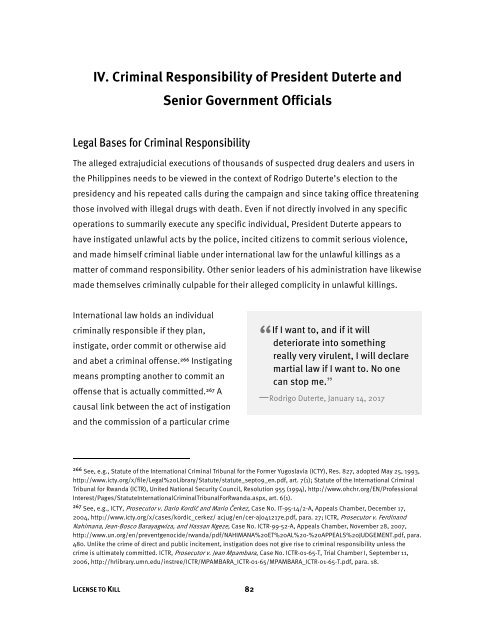“License to Kill”
nDPE309A46S
nDPE309A46S
Create successful ePaper yourself
Turn your PDF publications into a flip-book with our unique Google optimized e-Paper software.
IV. Criminal Responsibility of President Duterte and<br />
Senior Government Officials<br />
Legal Bases for Criminal Responsibility<br />
The alleged extrajudicial executions of thousands of suspected drug dealers and users in<br />
the Philippines needs <strong>to</strong> be viewed in the context of Rodrigo Duterte’s election <strong>to</strong> the<br />
presidency and his repeated calls during the campaign and since taking office threatening<br />
those involved with illegal drugs with death. Even if not directly involved in any specific<br />
operations <strong>to</strong> summarily execute any specific individual, President Duterte appears <strong>to</strong><br />
have instigated unlawful acts by the police, incited citizens <strong>to</strong> commit serious violence,<br />
and made himself criminal liable under international law for the unlawful killings as a<br />
matter of command responsibility. Other senior leaders of his administration have likewise<br />
made themselves criminally culpable for their alleged complicity in unlawful killings.<br />
International law holds an individual<br />
criminally responsible if they plan,<br />
instigate, order commit or otherwise aid<br />
and abet a criminal offense. 266 Instigating<br />
means prompting another <strong>to</strong> commit an<br />
offense that is actually committed. 267 A<br />
causal link between the act of instigation<br />
“<br />
If I want <strong>to</strong>, and if it will<br />
deteriorate in<strong>to</strong> something<br />
really very virulent, I will declare<br />
martial law if I want <strong>to</strong>. No one<br />
can s<strong>to</strong>p me.”<br />
―Rodrigo Duterte, January 14, 2017<br />
and the commission of a particular crime<br />
266 See, e.g., Statute of the International Criminal Tribunal for the Former Yugoslavia (ICTY), Res. 827, adopted May 25, 1993,<br />
http://www.icty.org/x/file/Legal%20Library/Statute/statute_sept09_en.pdf, art. 7(1); Statute of the International Criminal<br />
Tribunal for Rwanda (ICTR), United National Security Council, Resolution 955 (1994), http://www.ohchr.org/EN/Professional<br />
Interest/Pages/StatuteInternationalCriminalTribunalForRwanda.aspx, art. 6(1).<br />
267 See, e.g., ICTY, Prosecu<strong>to</strong>r v. Dario Kordić and Mario Čerkez, Case No. IT-95-14/2-A, Appeals Chamber, December 17,<br />
2004, http://www.icty.org/x/cases/kordic_cerkez/ acjug/en/cer-aj041217e.pdf, para. 27; ICTR, Prosecu<strong>to</strong>r v. Ferdinand<br />
Nahimana, Jean-Bosco Barayagwiza, and Hassan Ngeze, Case No. ICTR-99-52-A, Appeals Chamber, November 28, 2007,<br />
http://www.un.org/en/preventgenocide/rwanda/pdf/NAHIMANA%20ET%20AL%20-%20APPEALS%20JUDGEMENT.pdf, para.<br />
480. Unlike the crime of direct and public incitement, instigation does not give rise <strong>to</strong> criminal responsibility unless the<br />
crime is ultimately committed. ICTR, Prosecu<strong>to</strong>r v. Jean Mpambara, Case No. ICTR-01-65-T, Trial Chamber I, September 11,<br />
2006, http://hrlibrary.umn.edu/instree/ICTR/MPAMBARA_ICTR-01-65/MPAMBARA_ICTR-01-65-T.pdf, para. 18.<br />
LICENSE TO KILL 82


